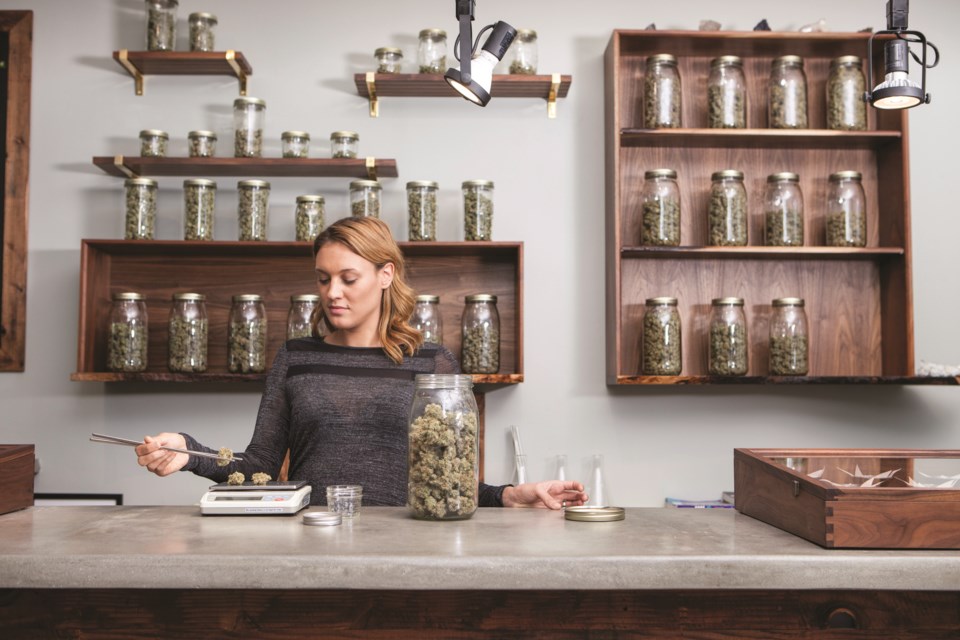It came nearly four years after legalization, but Whistler’s mayor and council have cemented a new Cannabis Retail Policy that would allow for up to five retail locations within specifically designated commercial areas.
First greenlit in December, the regulatory approach sets the permitting system and criteria for considering retail shops, and permits store use in each of Creekside, Function Junction, Nesters, the Village, and Village North. The stores are expected to open as early as next year.
Shops are proposed to be located a minimum of 750 metres apart, unless in the village, in which case the minimum is set at 150 m., and at least 300 m. from schools and the Meadow Park Sports Centre. Village and Village North locations should also be located off the pedestrian Village Stroll.
As previously reported in Pique, each store will be approved through a temporary-use permit (TUP), which will be issued on a case-by-case basis and last for three years—although retailers will be allowed to reapply to keep the permit open.
Subject to adopting several required bylaw amendments, an intake period will be established to consider the TUP applications in a batch application process. In previous community engagements, prospective retailers expressed some concern over the TUP process and a perceived lack of clarity around the approval criteria.
“The policy we’ve developed is intended to clarify the application intake review and approval process to permit new cannabis retail stores in Whistler. It outlines application requirements and evaluation criteria,” said RMOW manager of planning and projects John Chapman in a presentation to Whistler council on Tuesday, Aug. 2.
Applicants will be expected to submit a community impact statement that addresses the retail policy’s guiding principles, as well as meet a range of evaluation criteria, which includes everything from providing staff housing and a living wage to employees, to climate leadership and a commitment to Whistler’s community health and social strategy goals.
“The policy creates a clear and transparent process for approvals. It is seeking applicants that will address Whistler’s mountain character, prioritize community well-being, augment the local economy, balance resort and community demand and support and advance reconciliation with the Squamish Nation and Lil’wat Nation,” Chapman said.
The creation of the new policy took into account the municipality’s Official Community Plan along with extensive consultation and community input on how the policy should be designed. Overall, the policy received general support from the cannabis industry, although some concerns were raised, again, over the TUP process, with potential applicants expressing a preference for a quick and streamlined approval framework, noting the challenge of holding a lease on a commercial property through a lengthy approval process. There was “strong support” for a scoring system with clear and transparent criteria over a lottery system. Comments were also in favour of having local ownership in place to maximize benefit to the community.
While Whistler council was generally happy with the policy brought forward by staff, there was some concern raised about the message legal weed shops could send to youth in the community.
“I notice that one of your guiding principles is a commitment to community health and safety. I believe you were here today for part of the presentation from Communities That Care. (See related story on page 15.) One of the prevention priorities is altering students’ perception that alcohol and marijuana are safe and consequence-free. So hopefully, that will be part of that community education,” said Councillor Cathy Jewett.
Chapman assured Jewett that applicants would be expected to help with education and noted that proponents of the policy believe allowing legal pot shops will help with harm prevention.
“We’ve heard from many of the community groups we’ve met with that they are proponents of establishing a regulatory framework,” Chapman said.
“This is an alternative to other ways folks might obtain cannabis and cannabis products. The regulated stores sell products grown and manufactured in licensed farms and factories owned and governed by the laws of British Columbia.”
Whistler Mayor Jack Crompton welcomed the new policy framework to improve reconciliation with local First Nations.
“My understanding is that this policy goes as far as allowed to support cannabis retail as a way to incorporate Squamish Nation- and Lil’wat Nation-owned and operated businesses into the local business community,” Crompton said.
“This kind of commitment to the economic component of reconciliation goes well beyond employment for Nation members. My hope and expectation is that anyone serious about applying to retail cannabis in Whistler will look to the Lil’wat Nation and Squamish Nation governments as business partners.”
To learn more, visit whistler.ca/cannabis.




